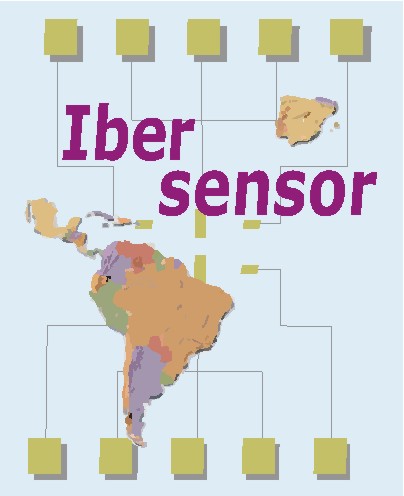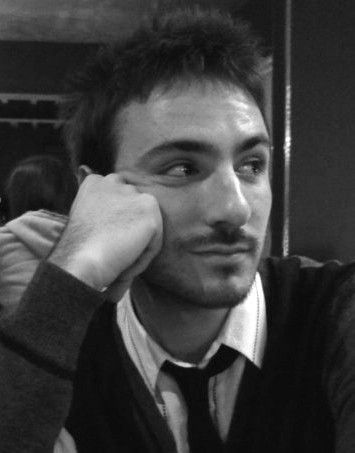
Dario Zappa
University of BresciaDario Zappa graduated in Electronic Engineering and took his Ph.D. in Material for Engineering at the University of Brescia. He joined SENSOR Lab in 2010, a well established lab in the field of gas sensors and solar cells, including personnel from both the University of Brescia and the National Research Council (CNR) National Institute of Optics (INO). Actually he is a Researcher at the CNR-INO. His research activities are focused on the synthesis and characterization (morphological, structural end electrical) of nanostructored metal oxides for different applications, including gas sensors and thermoelectric devices. In the last few years he was involved in some 7th EU programme projects (ORAMA, S3, MSP) and in some national projects (FIRB, SUSBIOREM). Since 2012 he is lecturer in Physics at the University of Brescia.

Jorge J. Santiago-Aviles
University of PennsylvaniaProf. Santiago-Aviles nació en Santurce Puerto Rico y se crio en el area metropolitana de San Juan. Estudio su primer grado universitario en Fisica y Matemáticas en la Universidad de Puerto RIco y su Ph.D. en la Universidad del Estado de Pennsylvania. Sirvió en la Fuerza Aerea Norteamericana durante la guerra de Viet Nam como investigador en el area de electro-luminiscencia de semiconductores II-VI. Al terminar su servicio militar trabajo como ingeniero para Union Carbide, como investigador para Argonne National Labs, como facultad para la Universidad de Puerto Rico, y finalmente en la Universidad de Pennsylvania, donde ha permanecido por varias decadas. Su area de interes en la investigación han sido materiales para aplicaciones en la metalurgia de contactos (VLSI), sensores / actuadores eléctricos, Almacenamiento de carga eléctrica en super-capacitores, y la enseñanza de la ciencia y tecnologia a la nano-scala / electronica y sistemas empotrados.
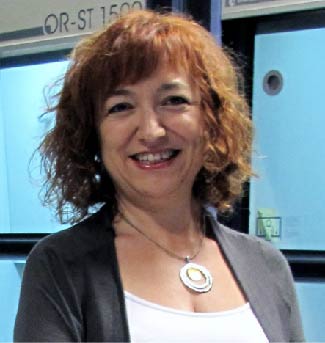
Laura M. Lechuga
Institut Català de Nanociéncia i Nanotecnologia. Spanish National Research Council (CSIC). CIBER-BBN.Laura M. Lechuga is Full Professor of the Spanish National Research Council (CSIC); since 2012 she is Adjunct Professor at the Dept. of Physics&Technology, at the Artic University of Norway (Norway) and since 2013 she is a Visiting professor at the Dept. of Microwaves and Photonics, School of Electrical and Computer Sciences, University of Campinas (Brazil).
Prof. Lechuga is the Head of the Nanobiosensors and Bioanalytical Applications Group in the Catalan Institute for Nanoscience and Nanotechnology (ICN2) in Barcelona (Spain). The principal focus of her research program is the technological development of photonic (plasmonics and silicon-based) and nanomechanical biosensors, their integration in portable lab-on-a-chip platforms and their application in clinical and environmental diagnostics. She has published over 150 articles, book chapters and conference proceedings, has 8 families of awarded patents at European, US or international level, and has presented more than 100 invited research papers at international level. She has been the driving force for the establishment of one spin-off company in 2004 (SENSIA, SL, which was sold to a large industrial Group in 2012) and co-founder of a new spin-off in 2010 (BIOD, SL).
Prof. Lechuga is associate editor of the IEEE Photonics Journal, associate editor of the J. Optics and Laser Technology (Elsevier) and is at the Editorial Board of the Journal of Nanobiosensors in Disease Diagnosis. She has been nominated as Fellow of the Optical Society (OSA) in 2014, and she is a member of the International Society for Optical Engineering (SPIE), and member of the European Optical Society (EOS). She is a member of Permanent Steering Committees of Advanced Study Course on Optical Chemical Sensors (ASCOS) and Europt(r)ode Conference Series.
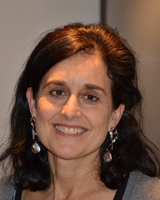
Cecilia Jiménez-Jorquera
Instituto de Microelectrónica de Barcelona (IMB-CNM), Spanish National Research Council (CSIC)Cecilia is Ph.D. in Chemistry and Scientific Researcher at the Instituto de Microelectrónica de Barcelona (IMB-CNM), CSIC, Spain. She joined the Chemical Transducer Group (GTQ) at the IMB-CNM in January 2000. She has been the Head of this group from January 2003 to January 2013. She has been a member of the Science and Physics Technology Area Committee of the CSIC from July 2008 to June 2012
She is specialist in the development of (bio)chemical sensors, mainly electrochemical semiconductor-based sensors based on ISFETs (Ion selective Field Effect Transistors), metal thin film microelectrodes, microelectrode arrays (UMEAs) and interdigitated electrodes. Her research is focused on the fabrication of (bio)sensors modifying the transducers by means of ionic, enzymatic membranes, immunoreagents and nanomaterials and their application to areas such as environmental control, industrial processes monitoring, mainly in food industry, clinical and biomedical analysis and cell culture’s monitoring. She is also specialist in the development of integrated analytical microsystems ( μTAS).
She has participated in a few projects from the 7th EU programme and actually she is the PI of a FP7 project within the SME-Capacities program. She has collaborated with companies in the area of instrumentation, environmental control and food processes with a total of nineteen contracts. She has published more than 70 articles in SCI journals within the field of sensors and microsystems.
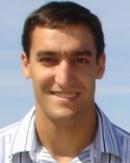
David Atienza
EPFL, SwitzerlandDavid Atienza is professor of EE and heads the Embedded Systems Laboratory (ESL) at EPFL, Switzerland. He received his MSc and PhD degrees in CSE from UCM and IMEC, in 2001 and 2005, respectively. His research focuses on system-level design methodologies for multi-processor Systems-on-Chip (MPSoC), including thermal-aware design for 2D/3D MPSoCs, ultra-low-power architectures for wireless body sensor networks, memory management and interconnections design. In these fields, he is co-author of 190 publications in prestigious journals and conferences, several book chapters and six U.S. patents. He has received the IEEE CEDA Early Career Award in 2013, the ACM SIGDA Outstanding New Faculty Award in 2012 and a Faculty Award from Sun Labs at Oracle in 2011. He has also earned two best paper awards at the VLSI-SoC 2009 and CST-HPCS 2012 conference, and five best paper award nominations at the DAC 2013, DATE 2013, WEHA-HPCS 2010, ICCAD 2006 and DAC 2004 conferences. He currently serves as associate editor of IEEE T-CAD, IEEE D&T, and Elsevier Integration. He is an elected member of the Executive Committee of the IEEE CEDA, and was GOLD member of IEEE CASS from 2010 to 2012. He is Senior Member of IEEE and ACM.

Microelectronics Research center
Universidad de los AndesThe Microelectronics Research center (CMUA) is a research group currently dedicated to the design of devices and systems on micro and nanometric scales; the design of integrated circuits for specific applications; architectural, functional and physical level modeling and simulation; analysis of the societal impact of technology; smart system design; development of strategies for the incorporation of technology in curricula and assessment of its relevance. Additionally, CMUA also provides consultancy to the productive sector concerning electronic systems design.
Alba G. Ávila Bernal, Ph.D.
Doctor Avila started her studies at Universidad de los Andes, where she graduated from Electrical Engineering and Physics in 1996. She obtained a master's degree in Electrical Engineering from the same university and then she undertook a doctoral degree in Semiconductor Physics at the Cavendish Laboratory, Univerisity of Cambridge, United Kingdom. Currently, doctor Avila is asosiate professor at the Department of Electrical and Electronics Enginering in Universidad de los Andes.
Johann F. Osma, Ph.D.
Johann is a faculty member in the Department of Electrical Engineering and Electronics at Universidad de los Andes in Bogota, Colombia. Electronics Engineer and MSc degree in microelectronics and computers from the same university. MSc. degree in chemical engineering and PhD in chemical engineering from Rovira i Virgili University (Tarragona , Spain).
Interested on MEMS and microsystem design and fabrication adding biomolecules for improving material characteristics or functionality. Special interest on enzymes as biomolecules and systems for recognition or pattern recognition.
Fredy E. Segura-Quijano, Ph.D.
Realizo estudios de pregrado en la Universidad de los Andes, Bogotá Colombia. Hizo maestría en Electrónica y Computadores en la misma universidad en el 2000. Del 2000 al 2005 se desempeñó como profesor instructor en la Universidad de los Andes. Hizo estudios doctorales en la Universidad Autónoma de Barcelona, España defendiendo la tesis en el 2010. Desde el 2005 al 2010 trabajó como investigador en el Centro Nacional de Microelectrónica CNM-CSIC.
Actualmente trabaja como Profesor Asistente en la Universidad de los Andes. Sus áreas de trabajo incluyen: Desarrollo de plataformas de sistemas embebidos, RFID, telemetría inductiva, integración de biosensores en plataformas completas.
